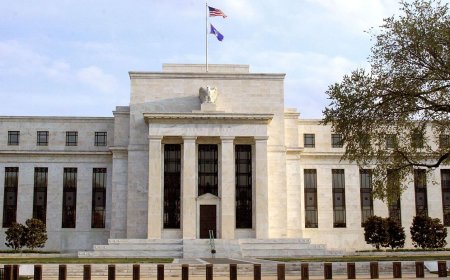UK equities mixed as investors assess corporate earnings, await key data
UK stocks were mixed as investors weighed corporate earnings from firms like Unilever and easyJet while awaiting key economic data on inflation and GDP later this week.

UK equity markets were mixed on Monday as investors digested a fresh batch of corporate earnings reports while bracing for critical economic data due later in the week, including inflation figures and GDP updates. The FTSE 100 hovered around the flatline, while the FTSE 250 posted mild gains, reflecting cautious optimism amid persistent macroeconomic uncertainty.
FTSE Indices Show Divergence
The FTSE 100, dominated by multinational corporations, closed slightly lower by 0.14% at 8,225.36, weighed down by underperformance in energy and financial stocks. In contrast, the more domestically-focused FTSE 250 rose 0.33% to 20,195.11, supported by mid-cap companies in retail, healthcare, and travel services.
The divergence suggests investors are rotating into sectors perceived as more resilient to economic shocks while trimming exposure to cyclicals.
Corporate Earnings Under the Microscope
Several UK-listed firms reported earnings today, offering a mixed picture of corporate health.
Unilever shares fell 2.1% after the consumer goods giant reported flat volume growth and flagged margin pressures in emerging markets due to higher input costs. Conversely, easyJet soared 4.8% after its quarterly earnings beat analyst expectations, driven by strong summer bookings and lower fuel costs.
“Investors are rewarding companies with pricing power and disciplined cost control,” said Victoria Scholar, Head of Investment at Interactive Investor. “While consumer-facing sectors remain sensitive to inflation, travel and hospitality have shown a remarkable post-COVID rebound.”
Market Sentiment: Waiting on Data
The broader market remained in wait-and-see mode, with traders closely watching upcoming UK Consumer Price Index (CPI) data, set for release on Wednesday. Economists expect headline inflation to dip slightly to 2.0%, down from 2.3% in the previous month, potentially influencing the Bank of England’s (BoE) next interest rate decision.
Friday will bring a preliminary estimate of Q2 UK GDP, a key measure of economic momentum.
“The inflation print could determine the BoE's tone in the upcoming policy meeting,” noted George Buckley, Chief UK Economist at Nomura. “A softer CPI reading may reinforce the case for a rate cut by the end of the third quarter.”
Global Cues Add Complexity
UK equities also mirrored global market indecision, with Wall Street opening mixed and European peers like Germany’s DAX and France’s CAC 40 posting marginal gains. A cautious tone also prevailed in Asia amid growing tensions in the South China Sea and concerns over China’s sluggish economic recovery.
Meanwhile, commodity markets offered no clear direction. Brent crude fell 0.5% to $82.90 per barrel on fading geopolitical risk premium, while gold held steady around $2,410/oz as investors remained risk-averse.
The pound sterling traded at $1.2882, strengthening slightly against the dollar amid expectations of narrowing interest rate differentials between the BoE and the U.S. Federal Reserve.
Sector Highlights
-
Energy stocks, including BP and Shell, lost ground as oil prices eased.
-
Financials underperformed, with Barclays and Lloyds both declining ahead of earnings.
-
Retail and travel led mid-cap gains, driven by WH Smith, Jet2, and Marks & Spencer.
Analyst Viewpoint: Volatility Ahead
Market experts caution that the next few weeks could remain volatile as earnings season continues and macroeconomic indicators shape monetary policy expectations.
Susannah Streeter, Senior Investment Analyst at Hargreaves Lansdown, commented:
“UK equities are trading in a narrow range, as investors look for clarity on inflation and central bank guidance. Until then, we may see rotation within sectors rather than a broad rally.”
Investor Outlook: Cautious but Selective
For investors, the current environment demands a selective approach. Defensive plays in consumer staples and healthcare may offer stability, while sectors like travel and leisure could benefit from robust seasonal demand.
Institutional flows also suggest a pivot to dividend-yielding stocks and undervalued small caps, particularly as valuations in the FTSE 100 remain attractive compared to U.S. counterparts.
“We maintain a neutral stance on UK equities,” said Andrew Milligan, former Head of Strategy at Aberdeen Standard Investments. “But we do see pockets of opportunity, especially if inflation continues to cool and interest rate cuts come into play later this year.”
As UK investors navigate a complex landscape of corporate earnings, macroeconomic data, and global headwinds, equity markets are likely to remain range-bound in the short term. The tone will be set largely by inflation numbers and signals from the Bank of England. Until then, market participants are expected to stay nimble and favour fundamentally strong names over broad-based exposure.
What's Your Reaction?
 Like
0
Like
0
 Dislike
0
Dislike
0
 Love
0
Love
0
 Funny
0
Funny
0
 Angry
0
Angry
0
 Sad
0
Sad
0
 Wow
0
Wow
0













































































